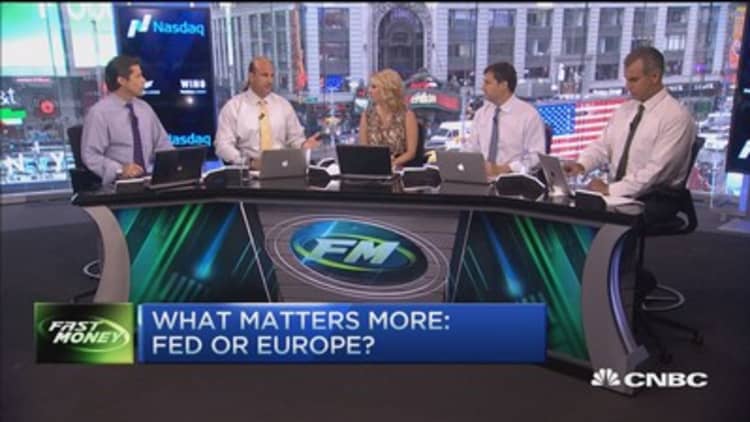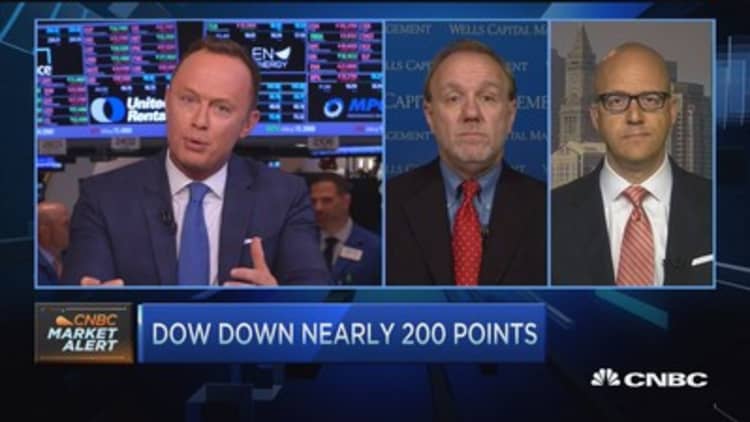


Wall Street believes the Fed is likely to start raising interest rates in September—unless financial markets, soothed by seven years of easy money, turn violent enough to derail it.
While the odds are not viewed as high, there is some talk that if a looming Fed rate hike coincides with already anxious markets, the reaction could become jarring enough to give the central bank pause.
Fingers are pointing at Greece as one such event that could trigger a negative reaction to slow the Fed's move away zero interest rates.
Deutsche Bank's chief U.S. economist, Joseph LaVorgna, said that a negative ending for the Greek debt drama could be a catalyst for market turbulence, as could an unexpected geopolitical event.
LaVorgna said he expects the Fed to raise interest rates for the first time in nine years in September, but the very idea of action by the U.S. central bank could also unhinge markets in just the right environment, and that could also delay its move.
"The markets could react, and the Fed could get cold feet," he said. "I would say it's a 1 in 3 chance."
Read MoreGreece on 'brink of disaster,' calls emergency meeting
"It's complicated by the fact that the last eight years August has been a month where you've had a lot of market turbulence, perhaps exasperated by the fact dealer desks aren't as fully staffed globally," LaVorgna said.
The VIX, the CBOE's volatility index on the S&P 500, saw double digit percentage gains or losses during four of those past six Augusts. The S&P 500, meanwhile, has been negative for August in six of the last 10 years, with an average loss of 0.2 percent.
Wall Street doesn't give a Greece-related market meltdown very high odds.
"As the Federal Reserve moves towards raising rates, it expects turbulence," said Marc Chandler, chief foreign exchange strategist at Brown Brothers Harriman. He said the U.S. central bank has been signaling it will raise rates and has commented on the fact markets could react. "This has to be one of the least kept surprises."
But if there is a global market meltdown, depending on the cause, it would slow the Fed's move to raise rates.
"If you were to tell me they kick Greece out (of the euro), and peripheral bond spreads over Germany suddenly widen, and that nascent recovery in the euro zone gets squashed then I think so. I don't think it's likely but we really won't know until after the EU summit on the 25th and 26th," Chandler said.
Chandler said the important date for Greece will be June 30 when the extension for its current assistance program runs out, and its payment of $1.6 billion to the IMF is due. That also is just ahead of much bigger payments due to the European Central Bank.
"Out of all the things that could stay the Fed's hand, I would put those as possible but unlikely. The more likely would be domestic problems. The economy rolls over, or we have another month like March with weak jobs," he said.
The Federal Reserve meets this Tuesday and Wednesday, and while the meeting is "live," there are no expectations it will hike rates until September.
The Fed, however, could give some nod to international concerns, putting a marker on the Greek situation.
RBS economist Michelle Girard said the Fed will not specifically mention Greece in its statement Wednesday, but it is watching the situation. It will become a concern only "to the extent, Greece impacts financial conditions and that could feed back to the U.S."
"They're not going to talk about it. I don think they really can," she said. Market focus, however, will immediately shift to Greece, after the Fed meeting.
Stocks sold off Monday, as Greece's talks with creditors collapsed over the weekend. The euro weakened and money moved into the German bund and U.S. Treasurys, in a flight-to-safety. European stocks sold off sharply and the spreads on peripheral debt widened.
LaVorgna said it's unclear how much reaction in financial markets would make the U.S. central bank hold off.
"The Fed previously highlighted the backup in mortgage rates, and they were worried about the debt ceiling crisis," in 2013, LaVorgna said. "Financial conditions hadn't really tightened."
Read MoreFed moves closer to policy change


